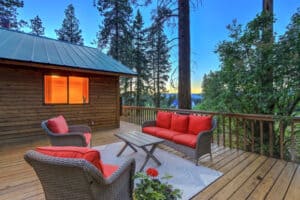
Vacation rental homes have been an alternative lodging option that has affected the hospitality industry in many ways. On one hand, this often provides families with a wider range of options when it comes to types of lodging and especially space required for larger traveling parties. That flexibility has come with a hefty price.
While it seems very consumer friendly on the surface, the lack of industry standards and quality controls provides an uneven experience. Each location is individually run and managed, and each one has different standards of cleanliness as well as cancellation fees. When you book a vacation rental property, most of the time it’s a gamble on what you’re going to walk into.
The Costs of Vacation Rentals
Airbnb and VRBOs are notorious for their extensive added fees, that aren’t always disclosed ahead of time. Things are changing now, and most are including those cleaning fees, taxes, and other charges in with the daily rate as advertised. But aside from the hidden fees, there are many other ways that vacation rentals bring their own “cost” to the convenience.
In areas of high tourism, it’s a particularly delicate balance between making it easy and possible for those tourists to visit, but also not anger or alienate the current residents. More short-term rentals create a scarcity of properties for long-term residents. As a result, many communities, cities, and even states are now instituting more rules and policies for vacation rentals to follow.
Extra Regulations to Balance the Hospitality Field

In Palm Springs, for example, vacation rentals now need a permit, safety inspections, occupancy limits, contracts, and monthly taxes and reporting to legally operate in that area. In New York City, properties such as apartments must be used for “permanent resident purposes,” requiring the same tenants on a single property for at least 30 days. Other zoning laws like in California have limitations on how close the properties can be to each other. There is a popular rule with vacation rentals called the 90-day rule, which allows properties to be used as a short-term rental for only 90 days out of the year. And in some places, Airbnb is not just heavily regulated but totally illegal altogether.
All of these restrictions and guidelines are in place as safeguards that benefit not only the locals in the area, but also to create some form of regulations that the short-term rental market found ways to bypass for so many years. The lack of regulations means no stability between properties and expectations. Unlike hotels, they don’t keep a regular staff and often aren’t charged with tourist taxes. This alone affects the economic impact of not only the community, but often the cities and states.
Short Term Rental Demand is Slowing
In 2020, all tourism sectors took a big hit from the COVID-19 pandemic. There was an initial boom in short term rentals towards the end of the year that carried into 2021. The appeal of traveling in a group to a single location. The flexibility and novelty of a unique location. The ability to work from anywhere, and the home-like atmosphere with a vacation setting.
Lower interest rates in the housing market created a boom for more short-term rentals to be added to the market. And for a while, the occupancy rates were very high. But now reality is catching up, and cities have developed laws to help the local housing markets level out a bit, and restrict VRBOs, Airbnb, and other short-term rental properties. With the added complications of new requirements that need to be met, and the shift in demand to more traditional hotel stays, many short-term rentals are left empty for extended periods of time. They grew to meet a thriving demand in 2020, but now that trends are shifting with the extra complications, many rental owners are left with empty properties.
Where Hotels Shine Through
Hotels are a long-standing institution that have been building trust for generations. Some brands are newer than others, but the idea is still there. As such, there has been time to put in place the necessary guidelines they all follow. When you book a room at a hotel, you have an understanding of what to expect for the level of service, cleanliness, and hospitality, depending on the brand, location, and type of accommodation. Even boutique hotels, cruises, and all-inclusive resorts follow the same general rules.

With hotels, it’s a very hands-on hospitality. The staff are there to greet you and provide you with an experience. Where you stay and your time there is very much a part of your vacation. Many hotels like boutique hotels even incorporate the local town in the design, so that it integrates seamlessly into the culture of the location. If you need recommendations, there is always someone at the hotel who can help guide your vacation.
With the size and staff on-hand, there are amenities available with hotel stays that aren’t often in rental properties. Luxury pools and spas, exercise rooms, golf courses,
With short-term rentals, it’s much more difficult to share that same warmth of hospitality. If there is any hospitality at all expressed, it’s in a very hands-off and distant way in the form of a note when you arrive. Or an email prior to your arrival. The amenities are limited to what is available at that property, only sometimes offering a pool and maybe some bikes.
The Future of Rental Properties
Short-term rental properties have been around for over a decade now, and they aren’t going away. There is a market for them and like it or not, they do add to the overall hospitality industry. In locations where even a small boutique hotel doesn’t make any sense, VRBOs allow for tourism to continue. They don’t currently play by the same rules, but hopefully some of these laws will help add some much-needed regulations. The hospitality industry is incredibly resilient, and the threat of short-term rentals will not be the demise of hotels. If the past two years are any indication, there will always be the desire to travel, and traditional hotel stays will not go anywhere.





